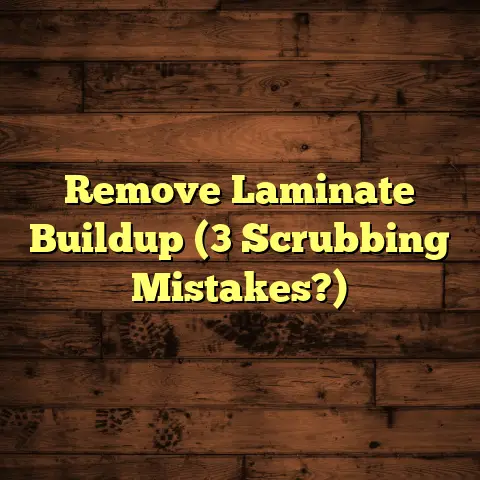Best Hardwood Pros: Find The Right One! (10 Questions)
Did you know that indoor air quality can seriously impact your health?
It’s true! As a flooring contractor with years of experience, I’ve seen firsthand how dust, pet dander, and other allergens can wreak havoc, especially for allergy sufferers.
Think about it: many of us spend up to 90% of our time indoors!
Choosing the right flooring material is a crucial first step in creating a healthier home environment.
Carpets, while cozy, can be notorious for trapping allergens.
That’s where hardwood floors come in.
They offer a smooth, non-porous surface that’s much less likely to harbor allergens, making them a fantastic option for allergy sufferers.
But here’s the catch: the quality of the hardwood and, more importantly, the installation, can make or break the deal.
That’s why I’ve put together this guide.
My goal is to equip you with the knowledge you need to select the best hardwood professionals for your flooring needs.
We’ll do this by exploring ten critical questions.
These questions will help you separate the pros from the “so-so’s” and ensure a beautiful, healthy, and long-lasting hardwood floor.
Let’s dive in!
1. What are the different types of hardwood flooring available?
Okay, let’s talk hardwood!
It’s not all created equal, and understanding the different types is essential.
We’ll break down the basics: solid vs. engineered hardwood and the fantastic variety of wood species.
These choices will impact both the aesthetics of your home and the potential for allergens.
Solid Hardwood: This is the classic!
Think planks milled from a single piece of wood.
It’s durable, long-lasting, and can be refinished multiple times, giving it a potentially very long lifespan.
However, solid hardwood is more susceptible to moisture and temperature changes, which can lead to warping or gapping.
Engineered Hardwood: This option is made of multiple layers of wood veneer bonded together with a top layer of solid hardwood.
Engineered hardwood is more dimensionally stable than solid hardwood.
This makes it a better choice for basements or areas with high humidity.
Wood Species: Now for the fun part!
The species of wood you choose will dramatically impact the look and feel of your floor.
Here are a few popular options:
-
Oak: A classic choice, oak is known for its durability and distinctive grain pattern. It’s also readily available and relatively affordable.
-
Maple: Maple offers a smoother, more uniform grain than oak and is a lighter color. It’s also very durable and resistant to scratches.
-
Cherry: Cherry is prized for its rich, reddish-brown color and elegant grain. It’s a softer hardwood, so it may be more prone to dents and scratches.
-
Hickory: Hickory is one of the hardest and most durable domestic hardwoods. It has a distinctive grain pattern and can range in color from light brown to reddish-brown.
-
Walnut: Walnut is a luxurious hardwood with a rich, dark brown color and a beautiful grain pattern. It’s a softer hardwood than oak or maple.
Allergen Considerations: While hardwood floors are generally better for allergy sufferers than carpets, some factors can influence allergen levels.
For example, floors with more texture or wider gaps between planks can trap more dust and debris.
Also, the finish used on the floor can affect allergen levels.
Some finishes may off-gas volatile organic compounds (VOCs), which can irritate allergies and asthma.
I always recommend opting for low-VOC or no-VOC finishes for a healthier home environment.
By understanding the different types of hardwood flooring available, you can make an informed decision.
This decision will impact both the look and feel of your home and the air quality for you and your family.
2. How do I evaluate the reputation of hardwood flooring professionals?
Okay, you’ve got a handle on the different types of hardwood.
Now, let’s talk about finding the right professional to install it.
Their reputation is everything!
Think of it as a detective mission.
You need to gather evidence before making a decision.
Online Reviews: This is your first stop!
Websites like Google, Yelp, Houzz, and the Better Business Bureau (BBB) are treasure troves of information.
Pay attention to the number of reviews and the overall rating.
But don’t just look at the stars.
Read the reviews carefully, looking for patterns.
Do people consistently praise their professionalism, communication, or quality of work?
Are there recurring complaints about delays, poor workmanship, or hidden fees?
Take everything with a grain of salt, of course.
Some negative reviews may be from unreasonable customers, and some positive reviews may be fake.
But by looking at the overall trend, you can get a good sense of a contractor’s reputation.
References: Don’t be shy about asking for references!
A reputable contractor should be happy to provide you with a list of past clients who you can contact.
When you call these references, ask specific questions about their experience:
- Were they satisfied with the quality of the work?
- Was the project completed on time and within budget?
- Was the contractor responsive to their concerns?
- Would they hire the contractor again?
Certifications and Affiliations: Look for contractors who are certified by reputable organizations like the National Wood Flooring Association (NWFA).
NWFA certification demonstrates that a contractor has met certain standards of knowledge, skill, and professionalism.
Affiliation with professional organizations like the BBB or local home builders associations can also be a sign of a reputable contractor.
These organizations often have codes of ethics and dispute resolution processes.
Beyond the Basics: Don’t stop there!
Ask your friends, family, and neighbors for recommendations.
Word-of-mouth is still one of the best ways to find a reliable contractor.
You can also check with your local building department to see if any complaints have been filed against the contractor.
By doing your homework and thoroughly researching potential contractors, you can significantly increase your chances of finding a reputable professional who will do a great job on your hardwood flooring project.
3. What should I look for in terms of experience and expertise?
Experience and expertise are critical when it comes to hardwood flooring installation.
This isn’t a DIY project for the faint of heart!
You want someone who knows their stuff, has seen it all, and can handle any challenges that may arise.
Years in Business: This is a good starting point.
A contractor who has been in business for many years is likely to have a proven track record of success.
They’ve probably seen a wide variety of flooring types, installation methods, and potential problems.
However, don’t automatically dismiss newer contractors.
They may be just as skilled and knowledgeable, and they may be more eager to earn your business.
Specific Experience: Ask about their experience with the specific type of hardwood flooring you’re considering.
Installing solid hardwood is different from installing engineered hardwood, and each wood species has its own unique characteristics.
Make sure the contractor has experience working with the materials you’ve chosen.
Installation Methods: There are several different methods for installing hardwood flooring, including nailing, gluing, and floating.
Ask the contractor which method they recommend for your project and why.
They should be able to explain the pros and cons of each method and choose the best option for your specific situation.
Problem-Solving Skills: Hardwood flooring installation is not always straightforward.
Unexpected problems can arise, such as uneven subfloors, hidden plumbing, or electrical wiring.
Ask the contractor how they handle these types of challenges.
They should be able to demonstrate their problem-solving skills and explain how they would address potential issues.
Continuing Education: The hardwood flooring industry is constantly evolving, with new products, techniques, and technologies emerging all the time.
Look for contractors who invest in continuing education and stay up-to-date on the latest trends.
This shows that they are committed to providing the best possible service to their clients.
Real-World Examples: Ask the contractor to show you examples of their previous work.
This could include photos, videos, or even visits to completed projects.
Seeing their work firsthand will give you a better sense of their skill and attention to detail.
I’ve seen contractors with beautiful websites and slick marketing materials.
But when I looked at their actual work, it was clear that they lacked the necessary experience and expertise.
Don’t be fooled by appearances.
Do your research and choose a contractor with a proven track record of success.
4. How do I assess the quality of materials used by hardwood pros?
The quality of the materials used in your hardwood flooring project is just as important as the quality of the installation.
After all, even the best installer can’t make up for substandard materials.
Durability: Hardwood flooring is an investment.
You want it to last for many years, even with heavy foot traffic.
Look for hardwoods with a high Janka hardness rating.
The Janka hardness test measures the resistance of wood to denting and wear.
The higher the rating, the more durable the wood.
Oak, maple, and hickory are all good choices for high-traffic areas.
Softer woods like cherry and walnut may be more prone to dents and scratches.
Finish: The finish on your hardwood floor will protect it from wear and tear, moisture, and stains.
There are several different types of finishes available, including polyurethane, varnish, and oil-based finishes.
Each type has its own pros and cons in terms of durability, appearance, and ease of maintenance.
I generally recommend polyurethane finishes for their durability and water resistance.
However, oil-based finishes can provide a more natural look and feel.
Environmental Sustainability: If you’re concerned about the environmental impact of your flooring, look for hardwoods that are certified by the Forest Stewardship Council (FSC).
FSC certification ensures that the wood comes from responsibly managed forests.
You can also look for hardwoods that are locally sourced, which can reduce the carbon footprint of your project.
Sourcing of Materials: Don’t be afraid to ask your contractor about the sourcing of their materials.
Where does the wood come from?
Is it sustainably harvested?
Is it manufactured in a facility that meets environmental standards?
A reputable contractor should be transparent about their sourcing practices and happy to answer your questions.
Visual Inspection: Before the installation begins, take the time to inspect the materials yourself.
Look for any defects, such as cracks, knots, or warping.
Make sure the color and grain are consistent throughout the batch.
If you have any concerns, don’t hesitate to raise them with your contractor.
Documentation: Ask your contractor to provide documentation about the materials they are using, such as product specifications, warranty information, and FSC certification.
This will give you peace of mind knowing that you are getting high-quality, sustainable materials.
I once had a client who insisted on using reclaimed hardwood flooring.
While I admired her commitment to sustainability, the reclaimed wood was full of nails, splinters, and other defects.
It was a nightmare to install, and the finished product was not nearly as durable as it would have been with new hardwood.
Sometimes, the best choice is not the most environmentally friendly choice.
It’s important to balance your values with the practical considerations of your project.
5. What are the costs associated with hardwood flooring installation?
Let’s talk money!
Understanding the costs associated with hardwood flooring installation is crucial for budgeting and avoiding surprises.
Materials: The cost of materials will depend on the type of hardwood you choose, the square footage of your project, and the quality of the finish.
Expect to pay anywhere from \$3 to \$12 per square foot for the hardwood itself.
The cost of underlayment, adhesives, nails, and other materials will add to the overall cost.
Labor: Labor costs will vary depending on the contractor’s experience, the complexity of the project, and your location.
Expect to pay anywhere from \$3 to \$8 per square foot for labor.
More complex installations, such as those involving intricate patterns or custom borders, will typically cost more.
Subfloor Preparation: Before installing hardwood flooring, it’s essential to ensure that the subfloor is level, clean, and dry.
If the subfloor is not in good condition, it may need to be repaired or replaced.
This can add significantly to the overall cost of the project.
Additional Services: Some projects may require additional services, such as removing existing flooring, moving furniture, or refinishing existing hardwood floors.
Be sure to factor these costs into your budget.
Detailed Quotes: Always get detailed quotes from multiple contractors before making a decision.
The quote should include a breakdown of the costs for materials, labor, and any additional services.
Make sure the quote is clear and comprehensive, and don’t be afraid to ask questions if you don’t understand something.
Hidden Costs: Be aware of potential hidden costs, such as permits, disposal fees, and sales tax.
These costs can add up quickly, so it’s important to factor them into your budget.
Negotiation: Don’t be afraid to negotiate with contractors.
They may be willing to offer discounts or price matching to win your business.
However, be wary of contractors who offer extremely low prices.
They may be cutting corners on materials or labor, which could lead to problems down the road.
Payment Schedule: Discuss the payment schedule with your contractor before the project begins.
A typical payment schedule might involve a down payment upfront, progress payments as the project progresses, and a final payment upon completion.
Avoid contractors who demand a large down payment upfront.
I once had a client who hired a contractor who offered a very low price.
However, the contractor demanded a large down payment upfront and then disappeared with the money.
The client was left with no flooring and no recourse.
It’s always best to work with a reputable contractor who has a proven track record of success.
6. How can I determine if a hardwood pro understands my specific needs?
Communication is key!
You need to ensure that your hardwood pro understands your vision and can translate it into reality.
Communicate Your Preferences: Be clear about your preferences from the outset.
What type of hardwood are you interested in?
What color and finish do you prefer?
What is your budget?
The more information you provide, the better able your contractor will be to understand your needs.
Ask Questions: Don’t be afraid to ask questions.
Ask about their experience with the type of hardwood you’re considering.
Ask about their installation methods.
Ask about their warranty policies.
A good contractor will be happy to answer your questions and address your concerns.
Gauge Their Understanding: Pay attention to how the contractor responds to your questions.
Do they seem knowledgeable and experienced?
Do they listen carefully to your concerns?
Do they offer helpful suggestions and solutions?
If a contractor seems dismissive or uninterested, it may be a sign that they are not a good fit for your project.
Examples of Questions: Here are some specific questions you might ask to gauge their understanding of your vision:
- “Have you worked with this type of hardwood before? What were the challenges and how did you overcome them?”
- “Can you show me examples of projects where you used a similar color and finish?”
- “How will you ensure that the subfloor is properly prepared for the hardwood installation?”
- “What are your recommendations for maintaining the hardwood floor after it’s installed?”
- “How will you protect my furniture and belongings during the installation process?”
Listen Carefully: Pay close attention to the contractor’s answers.
Do they seem confident and knowledgeable?
Do their answers align with your preferences and expectations?
If you have any doubts, don’t hesitate to ask for clarification.
Trust Your Gut: Ultimately, you need to trust your gut.
Do you feel comfortable working with this contractor?
Do you believe they understand your needs and can deliver the results you’re looking for?
If something doesn’t feel right, it’s best to move on and find another contractor.
I once had a client who was very particular about the color of her hardwood floor.
She had spent months searching for the perfect shade of gray.
When she met with the contractor, she made it clear that the color was her top priority.
However, the contractor seemed more interested in talking about the installation process than the color.
My client had a gut feeling that the contractor wasn’t really listening to her.
She decided to go with another contractor who paid closer attention to her preferences.
In the end, she was thrilled with the color of her new hardwood floor.
7. What kind of warranties and guarantees should I expect?
Warranties and guarantees are your safety net!
They protect you from defects in materials and workmanship.
Material Warranties: The hardwood flooring manufacturer typically provides a warranty on the materials themselves.
This warranty usually covers defects in the wood, such as warping, cracking, or delamination.
The length of the warranty can vary depending on the manufacturer and the type of hardwood.
Some warranties may be limited to a few years, while others may last for the lifetime of the floor.
Workmanship Warranties: The contractor should provide a warranty on their workmanship.
This warranty covers defects in the installation, such as gapping, unevenness, or squeaking.
The length of the workmanship warranty can vary depending on the contractor.
I typically offer a one-year warranty on my workmanship.
What’s Covered: Make sure you understand what is covered and what is not covered by the warranties.
Warranties typically do not cover damage caused by misuse, abuse, or improper maintenance.
They also may not cover damage caused by natural disasters, such as floods or earthquakes.
Read the Fine Print: Read the warranty documents carefully before signing a contract.
Pay attention to the exclusions and limitations.
If you have any questions, ask the contractor or manufacturer for clarification.
Importance of Protection: Warranties provide peace of mind knowing that you are protected if something goes wrong.
They also demonstrate that the contractor and manufacturer stand behind their products and services.
Document Everything: Keep copies of all warranty documents, contracts, and invoices.
These documents will be essential if you need to file a claim.
Real-Life Scenario: I once had a client who had a problem with their hardwood floor a few months after it was installed.
The floor was squeaking in several areas.
I went back to the client’s home and inspected the floor.
I determined that the squeaking was caused by a problem with the subfloor.
Because I had provided a workmanship warranty, I was responsible for repairing the subfloor and fixing the squeaking.
The client was very grateful that I stood behind my work and resolved the issue promptly.
Without a warranty, the client would have been responsible for paying for the repairs themselves.
8. How do I know if the hardwood pro follows proper installation methods?
Proper installation is everything when it comes to hardwood flooring!
It’s the foundation for a beautiful, long-lasting floor.
Acclimatization: Hardwood flooring needs to acclimatize to the environment before installation.
This means allowing the wood to sit in the room for several days to adjust to the temperature and humidity.
Proper acclimatization prevents warping and gapping after installation.
Subfloor Preparation: The subfloor must be level, clean, and dry before installing hardwood flooring.
Any imperfections in the subfloor can cause problems with the finished floor.
The contractor should inspect the subfloor carefully and make any necessary repairs before proceeding.
Installation Techniques: There are several different methods for installing hardwood flooring, including nailing, gluing, and floating.
The contractor should choose the appropriate method based on the type of hardwood, the subfloor, and the client’s preferences.
Finishing Techniques: The finishing process involves sanding, staining, and applying a protective coating to the hardwood floor.
The contractor should use high-quality finishing products and apply them according to the manufacturer’s instructions.
Adherence to Standards: The National Wood Flooring Association (NWFA) has established standards for hardwood flooring installation.
A reputable contractor should be familiar with these standards and adhere to them.
Importance of Standards: Following proper installation methods ensures that the hardwood floor will look beautiful, perform well, and last for many years.
Red Flags: Be wary of contractors who cut corners or skip steps in the installation process.
This can lead to problems down the road, such as warping, gapping, or squeaking.
Questions to Ask: Here are some questions you can ask to ensure that the contractor follows proper installation methods:
- “How long will you allow the hardwood flooring to acclimatize before installation?”
- “How will you prepare the subfloor to ensure that it is level, clean, and dry?”
- “Which installation method do you recommend for this project and why?”
- “What type of finishing products will you use and how will you apply them?”
- “Are you familiar with the NWFA standards for hardwood flooring installation?”
My Experience: I once had to remove and replace a hardwood floor that was installed improperly by another contractor.
The contractor had failed to acclimatize the wood properly, and the subfloor was not level.
As a result, the floor warped and gapped within a few months of installation.
The client was very upset and had to pay me to remove the old floor and install a new one properly.
This experience taught me the importance of following proper installation methods.
9. What are the signs of a reliable hardwood flooring contractor?
Reliability is paramount!
You want a contractor you can trust to do the job right and stand behind their work.
Punctuality: A reliable contractor will be punctual and arrive on time for appointments.
They will also be respectful of your time and schedule.
Clear Communication: A reliable contractor will communicate clearly and effectively.
They will explain the project in detail, answer your questions, and keep you informed of progress.
Professionalism: A reliable contractor will conduct themselves professionally at all times.
They will be courteous, respectful, and clean.
Documentation: A reliable contractor will provide you with a written contract that outlines the scope of the project, the timeline, and the payment terms.
They will also provide you with copies of insurance certificates and licenses.
Willingness to Provide Documentation: A reliable contractor will be willing to provide you with references from past clients.
They will also be willing to show you examples of their previous work.
Positive Reviews: A reliable contractor will have positive reviews online and from past clients.
Check their reviews on websites like Google, Yelp, and the Better Business Bureau.
Good Reputation: A reliable contractor will have a good reputation in the community.
Ask your friends, family, and neighbors for recommendations.
Attention to Detail: A reliable contractor will pay attention to detail and take pride in their work.
They will ensure that the finished product is of the highest quality.
Problem-Solving Skills: A reliable contractor will be able to solve problems effectively and efficiently.
They will be able to handle unexpected challenges that may arise during the project.
Standing Behind Their Work: A reliable contractor will stand behind their work and offer a warranty on their workmanship.
They will be responsive to your concerns and willing to resolve any issues that may arise.
My Personal Experience: I once worked with a client who had a terrible experience with a previous contractor.
The contractor was unreliable, unprofessional, and did shoddy work.
The client was very stressed and frustrated.
I made it my mission to provide the client with a positive experience.
I was punctual, communicative, and professional.
I paid attention to detail and ensured that the finished product was of the highest quality.
The client was thrilled with the results and thanked me for restoring her faith in contractors.
10. How can I ensure a smooth and successful hardwood flooring project?
Planning and preparation are the keys to a smooth and successful hardwood flooring project!
Before Installation:
- Clear the Room: Remove all furniture, rugs, and other items from the room.
- Protect Your Belongings: Cover any remaining furniture and belongings with plastic sheeting.
- Prepare the Subfloor: Ensure that the subfloor is level, clean, and dry.
- Acclimatize the Hardwood: Allow the hardwood flooring to acclimatize to the environment for several days.
During Installation:
- Communicate with the Contractor: Maintain open lines of communication with the contractor.
- Monitor Progress: Check in on the project regularly to ensure that it is progressing according to plan.
- Address Concerns Promptly: Address any concerns you may have with the contractor immediately.
- Stay Out of the Way: Avoid interfering with the contractor’s work.
After Installation:
- Inspect the Floor: Inspect the finished floor carefully to ensure that it meets your expectations.
- Clean the Floor: Clean the floor according to the manufacturer’s instructions.
- Protect the Floor: Protect the floor from scratches and dents by using rugs and furniture pads.
- Maintain the Floor: Maintain the floor regularly to keep it looking its best.
Importance of Preparation: Proper preparation can prevent problems and delays during the project.
Open Communication: Open communication can ensure that the project stays on track and meets your expectations.
Post-Installation Care: Post-installation care can help to extend the life of your hardwood floor.
My Advice: Don’t be afraid to ask questions and voice your concerns.
This is your project, and you have the right to be involved in the process.
By following these tips, you can ensure a smooth and successful hardwood flooring project that you will enjoy for many years to come.
Conclusion:
Choosing the right hardwood flooring professional can feel overwhelming, but it doesn’t have to be!
By asking the right questions and doing your research, you can find a contractor who will provide you with a beautiful, healthy, and long-lasting hardwood floor.
Remember the ten critical questions we discussed:
- What are the different types of hardwood flooring available?
- How do I evaluate the reputation of hardwood flooring professionals?
- What should I look for in terms of experience and expertise?
- How do I assess the quality of materials used by hardwood pros?
- What are the costs associated with hardwood flooring installation?
- How can I determine if a hardwood pro understands my specific needs?
- What kind of warranties and guarantees should I expect?
- How do I know if the hardwood pro follows proper installation methods?
- What are the signs of a reliable hardwood flooring contractor?
- How can I ensure a smooth and successful hardwood flooring project?
For those with allergies, choosing hardwood is a fantastic first step.
But remember, the right contractor is essential for maximizing the health benefits and ensuring a beautiful, allergen-reducing floor.
Use these ten questions as your guide, and you’ll be well on your way to finding the perfect hardwood pro for your home improvement project!





